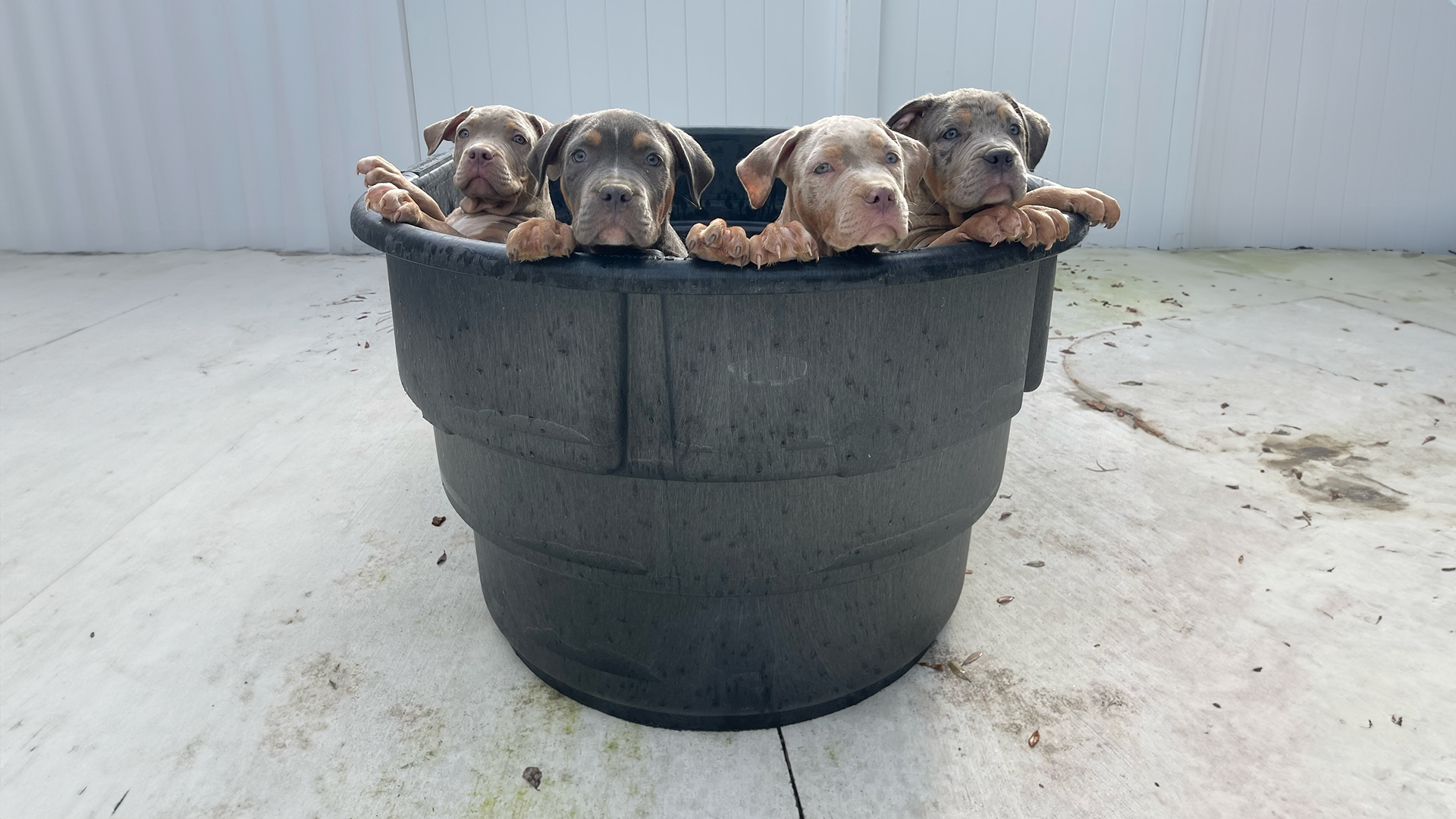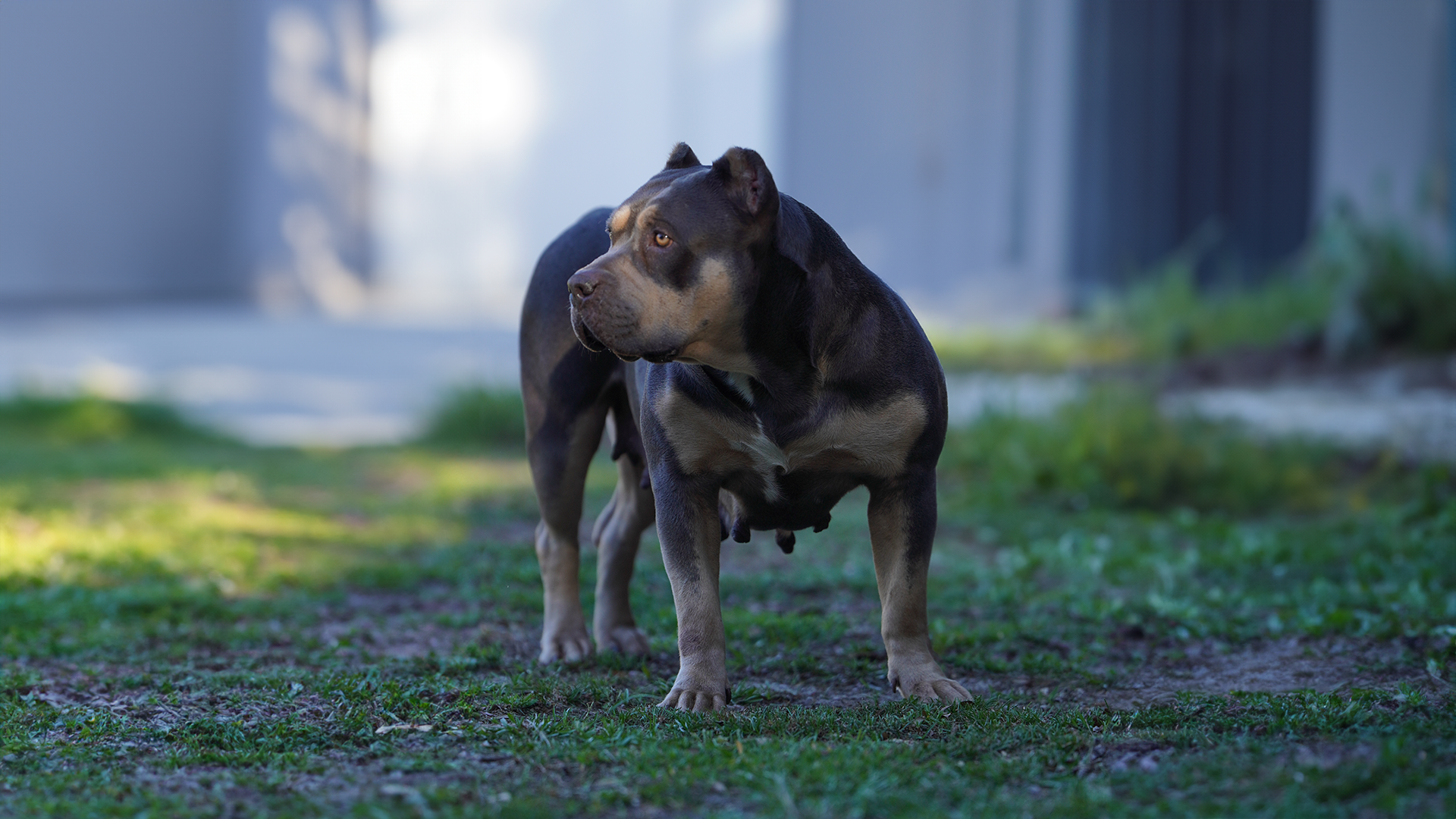At Royal XL Bullies, we are passionate about educating potential owners and enthusiasts about the fascinating world of American Bullies, particularly the tricolor XL American Bully. This unique and visually striking color pattern is a favorite among dog lovers and breeders, but there’s more to these beautiful animals than meets the eye. The tricolor coat not only enhances their visual appeal but also highlights the diverse genetic heritage that makes each Bully distinct. We take pride in the depth of knowledge and care that goes into breeding and raising each of our tricolor Bullies, ensuring they embody the strength, temperament, and health standards expected of the breed.
What Defines a Tri XL Bully?
The tricolor XL American Bully, often simply called tri, refers not just to any three-colored dog but to specific genetic color patterns. The tri coloration isn’t merely the presence of three colors on the coat, but involves specific genes and specific pattern locations. A true tricolor Bully displays a distinct pattern where the primary color (i.e., blue, lilac, chocolate, black, etc.) is complemented by patches or points of tan colors typically appearing above the eyes, on parts of the face, chest, legs, and under the base of the tail. This pattern is not merely about having three colors but about where and how these colors are expressed due to the dog’s genetic makeup. It’s this genetic complexity that makes the tricolor pattern both rare and highly sought after. Understanding the genetics behind the tri coloration helps breeders and enthusiasts appreciate the uniqueness of each Bully’s coat and ensures informed breeding practices when breeding to produce this pattern.
The Genetics Behind the Tricolor Pattern
The tri coat in American Bullies is controlled by specific genetic interactions within the Agouti gene. The key to this beautiful pattern lies in the presence of the ‘at’ allele in the Agouti gene sequence, which dictates the distribution of tan points in the coat. For an XL Bully to exhibit the tricolor pattern, it must inherit at least one ‘at’ allele from each parent. So, each parent must have this gene present (as a tri or a tri carrier) in order to pass it on to the offspring. This genetic requirement ensures the distinctive tan points that appear over the eyes, on the cheeks, and on the legs, setting tricolor Bullies apart from other coat patterns. The precise combination of these genetic elements not only enables the expression of tan points but also plays a key role in the overall appearance of the tricolor pattern in these dogs.
Base Colors in Tricolor Bullies
Since tricolor is a pattern of color points rather than a specific color, the base color of a tricolor Bully can vary, which again is controlled by other color genes passed on from both parents. Common base colors include:
Blue Tri: Features blue as the primary coat color.
Lilac Tri: A light purple base coat.
Chocolate Tri: Rich, warm red to brown hues.
Black Tri: A solid black base with contrasting lighter markings.
Each of these colors serves as the backdrop for the distinctive tricolor pattern, making each tricolor Bully unique.
Tricolor Bullies and Other Patterns
Tri XL Bullies can also exhibit other coat patterns, which adds to their appeal and complexity. For instance, the merle pattern – characterized by splotches of diluted pigment interspersed with patches of full color – can also occur alongside the tri pattern. Another pattern, brindle, which creates stripes where the tan markings are present, resulting in an even more unique appearance. This is sometimes referred to as trindle. Even more unique and rare is when all three of these patterns are present. These combinations can make tricolor Bullies not only striking but incredibly unique. Beyond these, some tricolor Bullies might display ticking or piebald patterns, which introduce small spots or larger patches of white, further enhancing their distinctiveness. Each tricolor Bully, therefore, depending on the genetics, has the ability to produce a unique array of color and patterns.
Popularity of the Tri American Bully
The tricolor pattern is highly popular among both XL Bully lovers and breeders. Its unique look with the rarity of certain color combinations, like merle tri and merle trindle, make these XL Bully puppies highly desirable. In breeding programs, tricolor XL Bullies are often preferred for their aesthetic appeal and the potential to produce a variety of stunning offspring, improving the diversity within the Bully breed. This preference has led to increased demand, encouraging breeders to focus on color alongside health and temperament. As a result, tricolor Bullies stand out for their uniqueness and appeal.
Tri XL Bullies at Royal XL Bullies
The tri XL American Bully represents a fascinating connection of genetics, appeal, and breed diversity. At Royal XL Bullies, producing this unique pattern as is just a small part of our commitment to breeding and raising the highest quality Bullies. Whether you’re an experienced American Bully breeder or a first-time dog owner, understanding the science and beauty behind the tricolor pattern can expand your appreciation for the American Bully breed. If you’re considering adding one of our tricolor XL American Bully puppies to your family, you’re choosing a puppy that is as genetically complete as it is visually unique.

